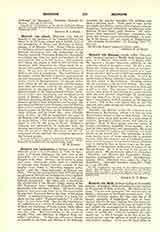

Heinrich von Meissen, usually called “FRAUENLOB” (woman’s praise), a Middle High German lyric poet; b. at Meissen about 1250; d. at Mainz, 1318. He received a learned education, probably at the cathedral school of his native town. He led a wandering life, roving over the greater part of Germany. Poems in praise of different princes enable us to trace his travels after 1278 as far as Bohemia and Carinthia in the south and Denmark in the north. In 1311 he settled down at Mainz, where he is said to have founded the first school of Mastersingers. Tradition relates that he was borne to his grave by women. His tomb in the cathedral of Mainz was renovated in 1842 and is still to be seen. The surname “Frauenlob” is said to have been given to him because in a poetic contest with the poet Barthel Regenbogen he maintained that the term Frau (in the sense of “lady”, “mistress”) was superior to Weib (woman, as the opposite of man). But it has been shown that he had the surname when quite young and before the poetic contest took place.
Heinrich von Meissen marks the transition from Minnesong to Mastersong; certain it is that the later Mastersingers looked to him as their model. He has written a great many lyric poems on a wide range of subjects, theological, ethical, erotic, and didactic or gnomic. Many of these poems sing the praises of women, matrimony especially being exalted. As a poet he lacks inspiration and spontaneity; his lyrics are the product of learning and reflection, and excel chiefly on the formal side. The artificiality of their form renders most of them unpalatable to modern readers, while the excessive use of far-fetched metaphors and the frequent occurrence of learned allusions tend to obscurity that at times verges on the unintelligible, as, for instance, in his poem in honor of the Blessed Virgin. He is at his best in the Spruch or gnomic poem. His poems were edited by Ettmuller, “Heinrichs von Meissen des Frauenlobes Leiche, Spruche, Streitgedichte und Lieder” (Quedlinburg—Leipzig, 1843). Selections were edited by Pfaff in Kurschner’s, “Deutsche National litteratur”, VIII, pt. I, pp. 234-239.
ARTHUR F. J. REMY

